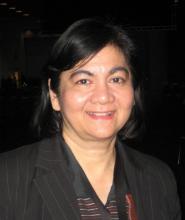SAN FRANCISCO – The FOLFOX4 regimen improved survival of patients with advanced hepatocellular carcinoma in a phase III trial conducted among nearly 400 patients in Asia and Southeast Asia.
Updated results showed that patients treated with FOLFOX4 had a 21% reduction in the risk of death, compared with their counterparts who were treated with doxorubicin. "The FOLFOX4 regimen [has] emerged as the first chemotherapy regimen to demonstrate prolonged survival in this population," commented lead investigator Dr. Sumitra Thongprasert, who reported the findings at a meeting on gastrointestinal cancers sponsored by the American Society of Clinical Oncology.
The 6.4-month median survival with FOLFOX4 was similar to the 6.5-month median survival seen with single-agent sorafenib (Nexavar) – the reference standard for HCC treatment – in a previous trial in a similar population (Lancet. Oncol. 2009;10:25-34), noted Dr. Thongprasert, an oncologist at the Chiang Mai (Thailand) University.
And the combination of sorafenib (a kinase inhibitor) with doxorubicin chemotherapy has shown greater benefit than doxorubicin alone (JAMA 2010;304:2154-60). Therefore, "our group concludes that further investigation of the combination of the FOLFOX4 regimen and sorafenib is warranted," she said.
Patients from mainland China, Taiwan, Korea, and Thailand were eligible for the trial if they had advanced and/or unresectable HCC and were cancer-treatment naive (except for surgery) or had experienced progression after previous adjuvant therapy completed at least a year earlier.
The patients were assigned in a 1:1 ratio to open-label treatment with the FOLFOX4 regimen (oxaliplatin plus 5-fluorouracil and leucovorin) given every 2 weeks, or with single-agent doxorubicin (50 mg/m2 IV) given every 3 weeks. Crossover was not permitted.
Doxorubicin was selected as the comparator agent "because this is a drug considered efficacious and [it] was a commonly used regimen in the region during the time of the study, which was 2006-2007, before the approval of sorafenib," Dr. Thongprasert explained.
The 371 patients were 49 years old on average, and 89% were men. Most (91%) had hepatitis B virus infection, and slightly more than half (54%) had cirrhosis. The majority had metastases (58%), Child-Pugh class A disease (88%), and a Barcelona Clinic Liver Cancer stage of C (80%).
The study’s prespecified final analysis, conducted after 266 deaths in the intent-to-treat population, showed a trend toward better median overall survival (the primary end point) among patients treated with FOLFOX4, compared with doxorubicin (6.40 vs. 4.97 months; hazard ratio, 0.79; P = .07). The benefit was significant in a post hoc analysis conducted after additional follow-up and 305 deaths (HR, 0.79; P = .04).
The FOLFOX4 group also fared better than the doxorubicin group in terms of median progression-free survival (2.93 vs. 1.77 months; P = .0002), response rate (8% vs. 3%; P = .02), and disease control rate (52% vs. 32%; P less than .0001).
The findings were similar in analyses that were restricted to the 279 Chinese patients, said Dr. Thongprasert. Overall and progression-free survival benefits were also seen in subgroups stratified by disease and patient characteristics as well as previous receipt of chemotherapy, except that there was little to no benefit of FOLFOX4 among patients with poorly differentiated (grade 3 or 4) tumors.
Patients in the FOLFOX4 group were more likely to experience grade 3 or higher adverse events (56% vs. 45%; P = .05). But rates of treatment discontinuation, serious adverse events, and death did not differ significantly.
Tolerability of FOLFOX4 was generally similar in patients with Child-Pugh class A and class B disease, according to Dr. Thongprasert. "However, the number of patients with Child[-Pugh class] B is quite small," she cautioned.
The trial, known as the EACH study, was supported by Sanofi-Aventis, manufacturer of oxaliplatin (Eloxatin), which is a component of the FOLFOX4 regimen. Dr. Thongprasert reported being a consultant to and receiving research funding from Sanofi-Aventis.


